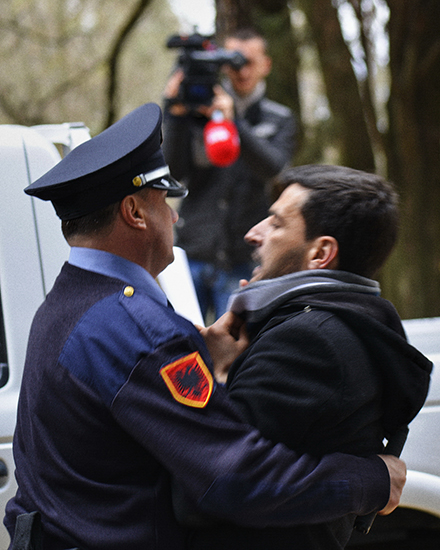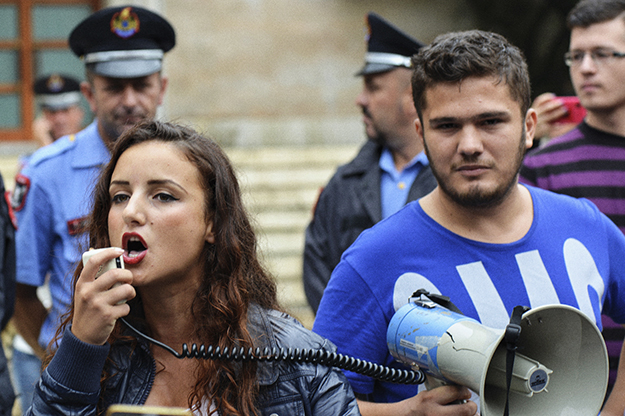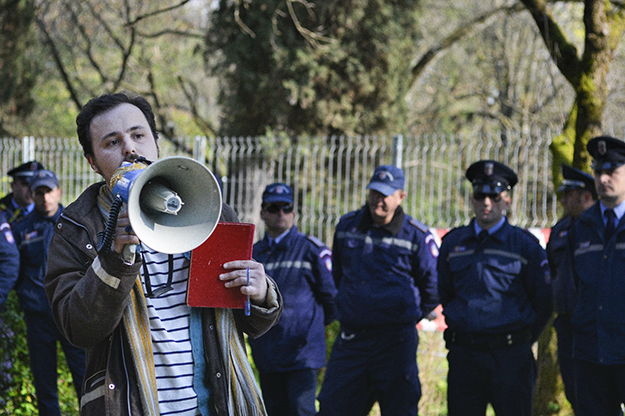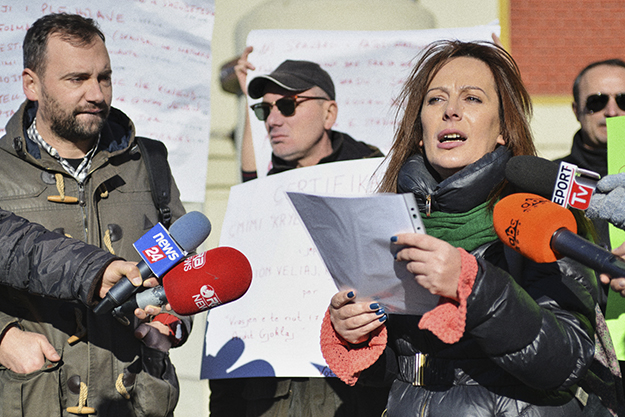In one of the halls of Tirana’s Court of First Instance, in front of a judge, in the dock where killers, rapists and robbers usually sit, there stood a student, a doctor and a schoolteacher. The hearing lasted a only couple of minutes, before the defendants were found guilty and sentenced with a month of imprisonment, which was later reduced to 40 hours of community service.
This was the decision of the court last October for Orges Zani, Mimoza Bocari and Altin Kuko, who publicly opposed the construction of a concrete playground in the Park on the Artificial Lake in Tirana. A fourth defendant, Ardit Mekshiqi, was notified through the media, since he had left the country.
Two years previously, the then freshly elected head of the Municipality of Tirana, Erion Veliaj, had concentrated his early energies on the management of public spaces. Initially he blocked the green space that lies in front of the National Gallery by inserting a giant installation. Shortly after, he allowed the construction of an underground parking lot below the capital’s oldest park, Rinia, then announced a tender to construct multifunctional, multi-storey buildings at the entrance of the Park on the Artificial Lake.
But when in February 2016 he ordered the clearing of part of a forest in the same park, so as to build a concrete playground and a cafe, a group of citizens and students took to the streets. During the demonstrations, numerous protesters were arrested, including Zani, Bocari, Kuko and Mekshiqi, who were then taken to court.
The protesters’ lawyer, Holta Ymeri, feels the developers incursions into the park, including fencing off large areas was the criminal act, rather than the protest. “The siege of the park was illegal, people reacted and protested within their rights,” she told K2.0.
Ymeri was herself one of the citizens who protested against the entrance of the construction vehicles into the park. “Police dragged protesters,” she explained. “One video even shows a policeman who hits a woman’s head. Surprisingly, this woman was also convicted by the court.”

The arrest of Zirkon Disha at the protest appeared premeditated, with the activist claiming he was placed in a police car before joining the protest. Photo: Artan Rama
Activist Zirkon Disha announced on his Facebook page that he would protest, but says that when he approached the scene, before he was able to join the demonstration, the police placed him inside a police car.
“As they grabbed me inside, I heard the radio: ‘Get Zirkon! Get Zirkon!’” he recalled. According to Disha, he then had his fingerprints taken at the police station, where a nervous atmosphere had developed due to stories of a police officer being hospitalized during the protest, with the mayor visiting the hospital. “It turned out to be a trick to be documented by cameras,” the activist claimed. “It was shown that the police fell over themselves.”
Protesters in court
Those protesting in the Park on the Artificial Lake are not the only citizens to find themselves in court after protests in recent years. Eight students at the Faculty of Social Sciences are currently appealing a conviction that would see them completing community service, after being convicted for their role in a protest during a visit by Prime Minister Edi Rama to their auditorium in November 2015.
In an expression of their disapproval of government education policies, they threw eggs in Rama’s direction, though failing to make contact. Nonetheless they were convicted in March, with the prosecutor initially having asked for the students to serve two months in prison, before facilitating the lesser community service sentence.

Student protests have also been followed by convictions, with one of the accused’s lawyers claiming violent treatment from the police. Photo: Artan Rama
One of the students’ lawyer, Dorian Matlija, felt the punishment excessive and the police’s tactics heavy handed. “They were sentenced to forced labor, even though the court did not identify any egg-breaking author,” he told K2.0. “During the arrest, the police exercized unauthorized control over student housing and exerted violence on some of them.”
The case against Pavjo Gjini, a former political science student, has passed two levels of judgment. His case was regarding a student march in October 2015 that was canceled by the police two hours before it began. Now he has to pay a fine of 30,000 lek (210 euros) if the Supreme Court upholds the same decision.
It is a fate that may also befall Andi Tepelena, a prominent member of the Alliance Against the Import of Waste (AKIP), who in July 2017 organized a protest against rising water prices in front of the Municipality of Tirana.
He gave notice to the police but made an error: He marked the 27th as the date instead of the 26th. The police allowed the rally but it was considered illegal and the Public Security Department filed the case with the prosecution.
“The next day I was summoned by the police to give evidence,” Tepelena said. “I told them that it was a lapse and that the Facebook notice kept the exact date. But then I read in the press that they had charged me and two others.”
Another protest that may have failed to follow protocol took place the following month in Kamza, a small city just outside of Tirana. When residents blocked urban waste incineration in the open air, expert and environmental activist Sazan Guri decided to support them. He announced his intentions to the authorities and the next day, in front of the Prime Minister’s Office, he headed a small rally.
Although peaceful and without any consequences for public order, the protest was subsequently considered to be illegal as according to the law, authorities should have been notified three days in advance. The materials were then passed to the prosecution office.
Another protester finding herself in trouble with the law in 2017 was Alida Karakushi, who decided to protest against the election of the new president. After writing ‘You are not my president!’ on a piece of paper, she went out into the streets with some friends, but was stopped by the police in front of the Parliament building. She was then accompanied to the police station.
“They came and told us we did not have permission to protest,” she told K2.0. “They told us they knew we were not violent, but according to them, we had to go to the police station.”

Eljan Tanini also found himself in court, after protesting the municipality’s decision to cut down trees he had planted. Photo: Artan Rama
A young free-painter and writer, Eljan Tanini, has already served a punishment for his role in a separate protest. For a long time, Tanini had planted trees voluntarily throughout Albania. In 2016, when the municipal authorities decided to cut down 40 of them in Tirana, he protested — the court sentenced him to two months in prison under Article 235 of the penal code: “Opposing the public official [sic].”
Tanini accepted the punishment, which was converted into free labor through community service. Tanini spent his time dusting the books on the old bookshelves in a local public library.
Permission or notice?
Those convicted are all activists who have protested in the name of various social movements. Aside from Tanini, all have been punished by authorities using Article 262 of the Criminal Code: ‘Organizing and Participating in Illegal Assembly.’ But is it the law and its use by the authorities that is the problem, rather than the protests?
According to the Report on Monitoring the Right to Free Assembly (2016-2017) conducted by Partners Albania, there is confusion between two concepts: “notice” and “permission.” While the Law on Assembly recognizes the concept of “notification,” the Criminal Code, considers the absence of “the permit” as a criminal offense.
It is a discrepancy hoped to be cleared up by Dorian Matlija. “For the canceled student march, we have decided to address the Constitutional Court, asking for an interpretation of the law regarding the right to a rally,” he told K2.0.
Holta Ymeri also sees an opportunity to use current cases to amend the law. “The right to protest is important and must be protected,” she declared. “We are determined to address Strasbourg if the Park protesters remain guilty.”
Vasilika Laci, leader of Civil Rights Defenders Albania, proposes a solution. “We need a strategy how to improve the law in favor of permitting. Let’s get together, let’s bring things in our favor…”
An illusory freedom of expression?
This trend of citizens experiencing legal issues following protests has caused concern that a false impression regarding freedom of expression is being created in Albania. Subsequent data can be used to present a misleading image of the way the right to protest is being administered.
For example, the aforementioned Partners Albania report stated that “there are improvements in the administration of assemblies,” after analysing data that the State Police itself provided — which showed that almost all rallies that had been requested in the past two years had been approved.
But the Director of the Tirana Police’s statement to K2.0, reveals what lies behind the numbers. “For us, it is important to respect procedure,” Ardi Veliu explained. “We determine the place and time of the protest. We do not stop, but if the criteria are not respected, we consider it illegal.”
Dorian Matlija, the lawyer involved in the student’s protest feels that decision-making on permits is selective. “Once, police stopped a street march of students on the premise that a foreign delegation would pass,” he told K2.0. “We verified the information and found out that there was no delegation.”


